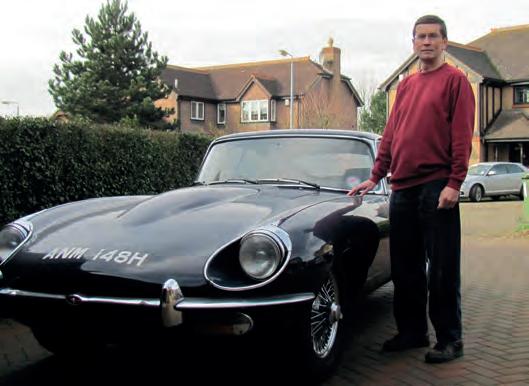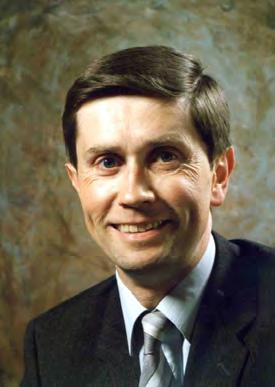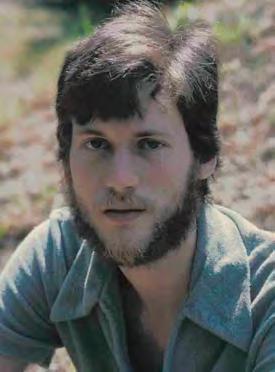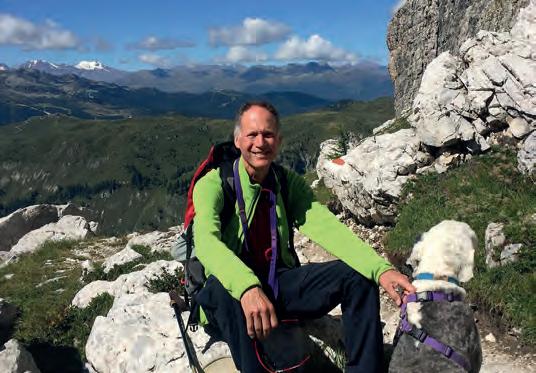
5 minute read
Alumni support Chemistry@Cambridge Opportunity Fund _________________________________________________________
Alumni have kickstarted the launch of our new Opportunity Fund with two generous gifts.
Inaugural gift
A gift of £10k from Dr Eddie Powell (Churchill 1967) was used by the Department to inaugurate the fund. Eddie completed his PhD in inorganic chemistry here under Martin Mays, and after an eventful career in nance and start-ups, he has become a well-known entrepreneur and business angel in the Cambridge bio-tech hub.
These days Eddie has reduced his business commitments to his collaboration with fellow alumnus Shamus Husheer in Heartfelt Technologies, a start-up which was featured in Chem@Cam Issue 60. Heartfelt has developed a device which uses photo technology combined with arti cial intelligence to detect when the feet of an individual who has su ered heart failure are swelling, which could indicate a potential recurrence.
Since he (mostly) retired ten years ago, Eddie says he and his wife have been fortunate to travel to many countries, and for him one of the most frustrating side e ects of the Covid epidemic was the restriction on travel. Now that things have opened up, they plan to re-start their voyages, but they will also try to avoid ying wherever possible – not only because they’ve grown to dislike airports over the years, but also as a nod to climate change and reducing their carbon footprint. “We love travelling by train – that’s where you’ll nd us,” he says. “I’m delighted that my gift is going to be used for the new fund,” says Eddie, who is also a generous supporter of Churchill College. “It seems like a good thing to do for a Department which is one of the most prestigious in Cambridge and the UK, and I’m glad the fund will be there for people to bene t from.”
Eddie says he has no speci c hopes for how his gift will be used. “To be quite honest, I think the Department is much better placed than I am to decide how to direct the funds, so I’m happy with that,” he says.
Building the fund
A second gift of £20k, left as a charitable bequest by Mrs Pamela Goldhill, has been directed to the fund by her son and executor Dr Jonathan Goldhill (Darwin 1976). Jon completed his PhD in organic chemistry under Professor Ian Fleming.
Eddie in 1985. Eddie now with his prize possession.

When Jon made the gift from his mother’s estate, he wasn’t aware that it would qualify for the Harding Challenge, which means that the donation has been matched, pound for pound, by a contribution to a University fund for undergraduate nancial support. So Jon has not only helped our Department, but he has also doubled his impact by helping undergraduates in the greatest need across Cambridge.
“All my gifts from my mother’s estate went to educational establishments of one sort or another,” says Jon, who is also a regular giver to his college. “My aim was to help people less fortunate than myself. We came from a relatively privileged age, when university education was free.”
Jon’s hope for the gift is “only that someone bene ts from it”. He says: “I hope that somebody can do something that they otherwise wouldn’t be able to. I’m not going to direct it – I’ll leave that to someone who knows what they’re doing.”
After completing an undergraduate degree in Chemistry at the University of Edinburgh, Jon joined Ian Fleming’s group for his postgraduate research “because of the type of research that was taking place”, he says. “It was not absolutely conventional organic chemistry and it was very interesting research.” Just down the bench from Jon was Ian Paterson, who is now a Professor Emeritus in this Department.

Jon as a PhD student in Ian Fleming’s group,1977.
Quenching their thirst
Professor Paterson recalls: “Jon and I worked and played hard together in Ian Fleming’s group. At the end of a long day in the lab, we often frequented the Panton Arms to discuss the latest results while quenching our thirsts, then heading back to check our reactions. I remember Jon’s sense of humour and they were fun and happy times, as well as producing a good number of highly cited publications. It’s fantastic that he has remembered the Chemistry Department by making this generous gift.”
After being awarded his PhD in 1979, Jon decided not to stay in academia. “In some ways I would have liked to, but in other ways I could see that there were people who were better than me, and also I didn’t think it really matched what I wanted to do”, he says. So after a few years in industry, Jon completed an MBA at London Business School, and began working in a large innovation group. “That’s when I realised I should never be working for a big rm”, he says, concluding that he preferred to be in charge of things and make his own decisions.
From that time on Jon has worked for himself, becoming cofounder of two telecommunications rms. After selling those, Jon and his business partner developed a search engine for data – graphs and tables on the internet. “We didn’t really know about software, but our ignorance was a big help or we wouldn’t have done it!” he says now.
Jon and his business partner then founded one of the few businesses in the world which employs image recognition software to extract data from unstructured documents. The technology is useful, for example, to get numbers from tables in nancial statements or industry reports. Jon also acts occasionally as an angel investor if a new technological start-up sounds interesting. His advice to young entrepreneurs is: “Don’t expect it’s going to be easy”.

Jon recently in the Dolomites.
Supporting our researchers
The Chemistry@Cambridge Opportunity Fund was set up to enable the Department to provide a range of support to postgrads and postdoctoral researchers, for example, by funding their participation in important workshops and conferences, and most recently to mitigate against interruptions or di culties with funding due to Covid or other unforeseen circumstances.
Head of Department Dr James Keeler says: “We are so grateful to Eddie and Jon for being the rst to contribute to our new fund. We hope others will follow their example, so the fund can continue to grow and help department members for many years to come. I would be happy to meet or speak with anybody who would like to nd out more.”










